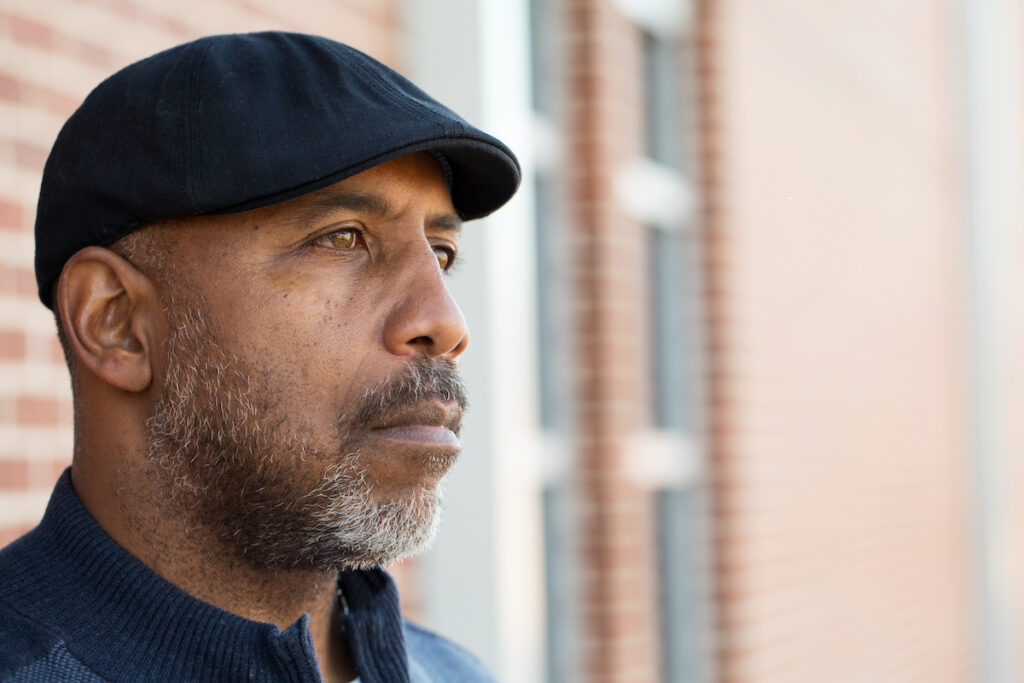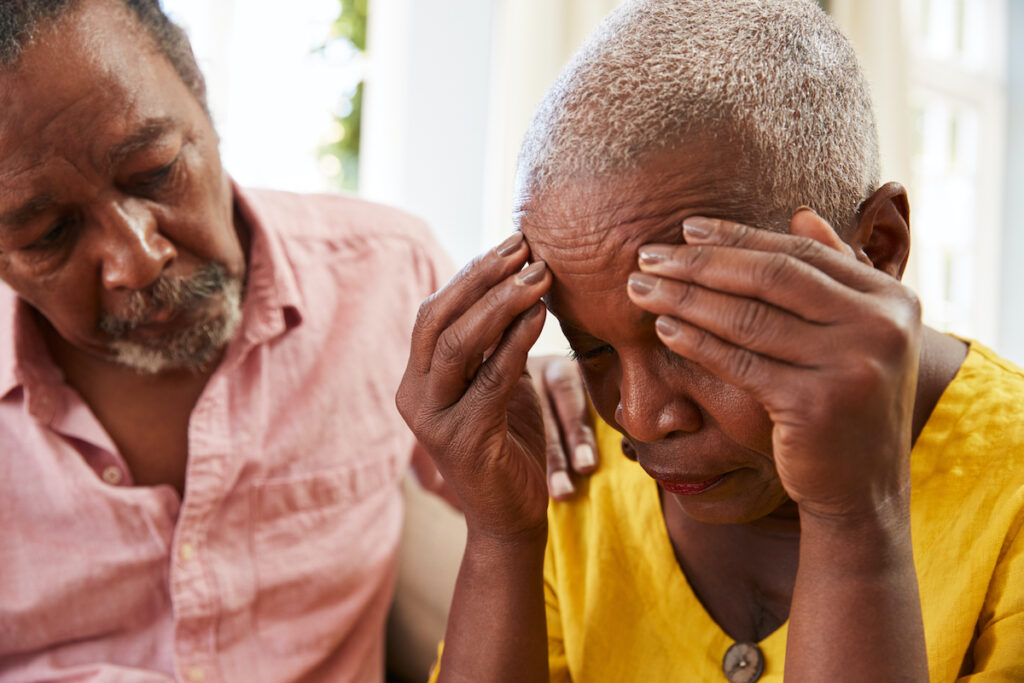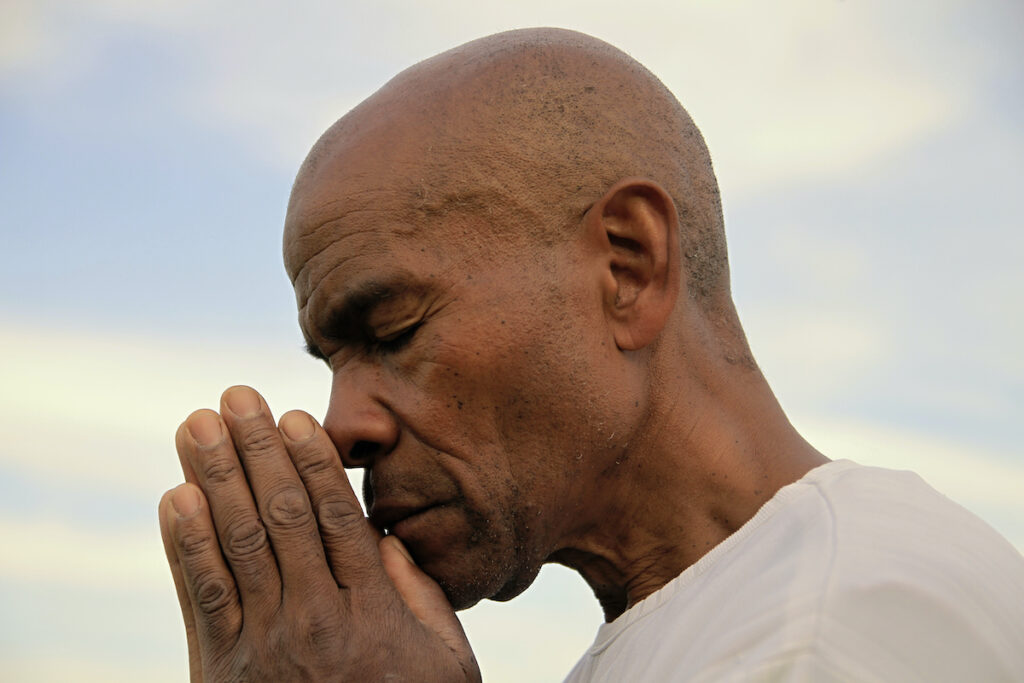
The older adult population is rising globally. The number of people aged over 65 years is predicted to rise from 524 million to 1.5 billion by 2050 (World Population Prospects, 2019). In the UK, there has been a 47% increase in the number of older adults since 1974 (ONS, 2019).
Depression is believed to affect 10-15% of older adults (Conner et al., 2010). However, 85% of older adults do not obtain any mental health support from the British National Health Service (NHS) (WHO, 2017). With the older adult population rising, it is important to understand how our mental health services can reflect the needs of older populations.
Rates of depression are thought to be higher in Black, Asian, and Minority Ethnic (BAME) communities than in White (Mental Health Foundation, 2007). Several aspects may affect the mental health of Black communities, including the impact of migration, racism and discrimination.
Despite awareness of the increased prevalence and decreased help-seeking in this community, older adults from BAME communities are an under-researched group.
Age and Race are protected characteristics in The Equality Act (2010) therefore it is important to understand the experiences and beliefs that underlie help-seeking behaviours among BAME older adults. By better understanding these experiences, we can ensure our health services deliver effective, culturally appropriate and accessible services.
Considering this, Bailey and Tribe (2021) aimed to explore how older Black Caribbean adults made sense of coping with depression and how we can better understand their views of help-seeking and accessing mental health services in the UK.

The older adult population is growing rapidly, however, 85% do not seek mental health support from the NHS. Rates of depression are believed to be higher in BAME communities than in white. This study explored the views of seeking help amongst older Black Caribbean adults.
Methods
Semi-structured interviews were conducted with eight UK Black Caribbean participants, aged between 65 and 79 years old.
Participants were recruited through the ‘snowballing’ method. In practice, this included word-of-mouth recruitment through lunch clubs and day centres in the general community.
The interviews were audio-recorded and transcribed in line with the Interpretative Phenomenological Analysis (IPA) protocols (Smith et al., 2009). IPA is a qualitative analysis approach that aims to provide detailed examinations of individuals’ lived experiences. The analysis was conducted in line with the four analytic principles of IPA:
- Subordinate themes from each transcript are listed within and across transcripts
- Subordinate themes are then located from and within the transcripts
- Themes are then re-structured and summarised
- The concluding themes are illustrated with statements that illustrate the researcher’s interpretation of the participant’s words.
Results
Three master themes emerged through the analysis. These included:
- ‘If you don’t know, you don’t seek help’
- ‘… I was depressed … I knew I was depressed …’
- ‘You have to decide’: Attitudes to help-seeking and mental health service use.
The authors of the paper, Bailey and Tribe (2021) decided to focus this paper on theme three due to its potential importance to clinicians and service providers. Participants help-seeking attitudes were summarised into four subordinate themes:
1. ‘Recognise and Start’
Participants reflected that the initial starting point for seeking help must include an acknowledgement and recognition of mental health difficulties from within. Not recognising the seriousness of mental illness may therefore inhibit health-seeking. Furthermore, participants reflected that there must be a desire and drive to want to change.
2. ‘Why should I go tell somebody my business?: Challenges and cultural beliefs
Several dilemmas and challenges were presented by participants when considering seeking help. These included:
- the influence of possible cultural and gendered beliefs on a decision;
- the role stigma plays in inhibiting help-seeking; and
- cultural differences between how Europeans and Caribbeans handle mental illness and religious beliefs.
It was clear that embedded ideologies and cultural, or religious beliefs may influence help-seeking behaviours.
3. ‘No guarantee’: professional services
A key pattern that ran throughout this theme related to the lack of confidence that older Black Caribbean adults may have in services for the following reasons:
- Some were suspicious of health professionals’ intentions. Reflecting on whether they were interested in looking after their wellbeing or whether they are doing it to satisfy a target requirement.
- There appeared to be a significant lack of trust in services. This typically stemmed from participants having a previous personal experience with a service that they were dissatisfied with. Interestingly, previous experiences seemed to influence future help-seeking even if it is an unrelated health matter, e.g. a bad experience with a GP may impact the likelihood of a participant seeking mental health support from another service.
- The long-waiting times of services were also acknowledged as deterrents from help-seeking.
Separate to a lack of confidence, misrepresentation of services was acknowledged as a barrier. Participants reflected that often Black people are misrepresented in services and they wish to find an advocate that can represent them.
4. ‘Just get on with it’
The final theme explored how participants’ upbringing and ingrained beliefs from childhood have a considerable influence on help-seeking behaviour. This included being brought up with the ideology of having a stiff upper lip or being encouraged to pull yourself together, as well as cultural and familial home remedies for illness. Therefore learnt behaviours or attitudes which focus on coping with depression independently may limit the likelihood that clients seek help externally.

The findings identify factors that influence older Black Caribbean adults’ views on seeking help for depression in the UK including difficulties in recognising when to seek help, cultural beliefs around mental health issues and lack of trust in services.
Conclusions
The authors concluded that several issues are influencing older Black Caribbean adults’ views on depression and help-seeking. This included participants’ past personal experiences of coping with depression, migratory histories, cultural and religious views, and personal relationships.

Past personal experiences of coping with depression, migratory histories, cultural and religious views and personal relationships all influence older Black Caribbean adults’ views on seeking help for depression in the UK.
Strengths and limitations
The current study provides a comprehensive analysis of the views of older Black Caribbean adults seeking help for depression. The use of qualitative data analysis ensures we develop a rich and detailed insight into the viewpoints of participants. In doing so, this allows the voice of a community to shine through. I believe this approach is particularly effective when exploring issues that are under-researched as it allows themes to emerge that may not have been previously considered. Therefore it provides a strong starting point for opening up the conversation on these issues.
However, there are some methodological limitations. For instance, this study had a small sample size of 8 participants. As such, it reflects a low representation of the population and would be inappropriate to generalise these findings as reflecting the views of the whole Caribbean community. Considering this, further, larger-scale research needs to be conducted to determine whether similar themes emerge. In doing so, this would ensure the reliability of the study findings.
Furthermore, there may have been some interviewer bias due to the subjective nature of qualitative data. This may impact the validity of the study results as themes typically emerge through the interviewers’ subjective-lens. This means that the interviewer’s previous experiences, biases, and expectations may unconsciously shape the study findings. Nevertheless, this is the case in many qualitative analyses and the use of participant quotes allows insight into the perspectives of participants.
It is also important to acknowledge that depression was self-defined in this study and included participants who hadn’t necessarily had lived experience of depression and help-seeking previously. Considering the personal nature of depression I believe it is vital to hear the views of those with lived experience and whether they did or did not seek help. This may provide greater insight and reflections into why older Black Caribbean adults may not reach out for help.
I would also be interested in reading further on the other two master themes that were not explored in this study (1. ‘If you don’t know, you don’t seek help’; and 2. ‘… I was depressed … I knew I was depressed …’). In doing so, this may allow us to reflect on the master themes as a whole.

The paper begins an important conversation on the help-seeking views of older Black Caribbean adults and provides rich data to do so. However, further research is needed to ensure these views are reflective of a community as a whole.
Implications for practice
As Bailey & Tribe (2021) rightfully acknowledge, the analyses presented in this study are imperative for mental health practitioners and service providers. Current mental health services are not meeting the needs of specific populations, including the older Black Caribbean community. It is important that we stray away from placing the blame/onus on communities to reach out for support but instead acknowledge that it is our responsibility, as practitioners and service providers, to ensure these needs are met. I believe it is not effective to label communities as ‘hard to reach’, instead we need to consider how we can work alongside leaders in the community to provide better care.
Considering this, further research is needed to build upon the current study. Specifically, it is important to consider ways in which mental health services can improve help-seeking behaviours, taking into consideration the views depicted. For instance, a key theme presented in the analysis focused on participants having a lack of trust in mental health services. Therefore, we need to consider how we can build trust between services and communities. This work would need to be co-produced with the community to ensure we are listening to their needs and any service changes directly target the issues at hand. In doing so, this presents a greater collaborative approach to improving accessibility.

Practitioners and service providers must reflect on how we can provide more accessible services for our community. Further research is needed to identify how to increase help-seeking behaviours amongst this population.
Statement of interests
None.
Links
Primary paper
Bailey, N. V., & Tribe, R. (2021). A qualitative study to explore the help-seeking views relating to depression among older Black Caribbean adults living in the UK. International Review of Psychiatry, 33(1-2), 113-118.
Other references
Conner, K. O., Copeland, V. C., Grote, N. K., Rosen, D., Albert, S., McMurray, M. L., Reynolds, C. F., Brown, C., & Koeske, G. (2010). Barriers to treatment and culturally endorsed coping strategies among depressed African American older adults. Aging & Mental Health, 14(8), 971–983.
Equality Act. 2010. Retrieved October 10, 2021.
Mental Health Foundation. (2016). Fundamental facts about mental health. Last accessed: 24 Oct 2021.
Office for National Statistics (ONS). (2019). Overview of the UK population. Retrieved October 10, 2021.
Smith, J., Flowers, P., & Larkin, M. (2009). Interpretative phenomenological analysis: Theory, method and research. Sage
World Health Organisation (WHO). (2017). Mental Health and Older Adults FACT Sheet. Retrieved October 10, 2021.
World Population Prospects. (2019). Highlights. United Nations Department for Economic and Social Affairs. Retrieved October 10, 2021.
Photo credits
- Photo by Annie Spratt on Unsplash

Hi Maisha
Thank you for the great work you are doing. I am a psychological therapist based in Manchester working for the NHS. I am also the BAME champion for our service and would welcome any information you have on improving access to psychological services and barriers faced by the African and Caribbean communities. I would also be interested in your work with prevention of intergenerational trauma and Improving support and outcomes for this target group. A response from a group of Caribbean people I use to work with pertaining to why rates of depression is higher in Caribbean people was term as Post Traumatic Slavery Disorder, along with other factors you have mentioned in your article.
Again, thank you for your good work and I look forward to any information you may have to improve access to psychological services for Caribbean people.
Paul